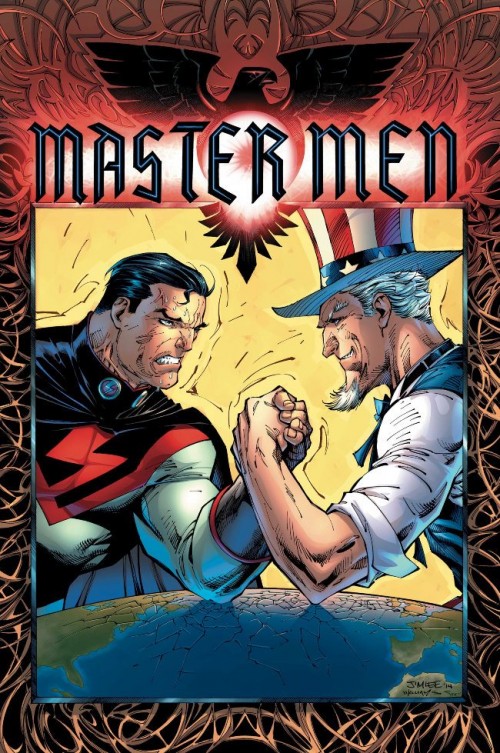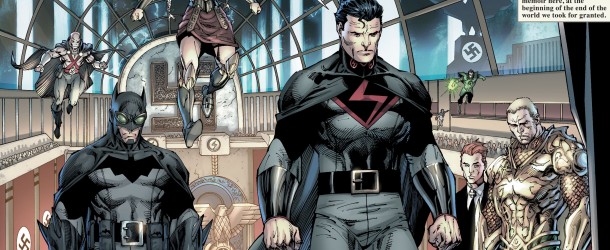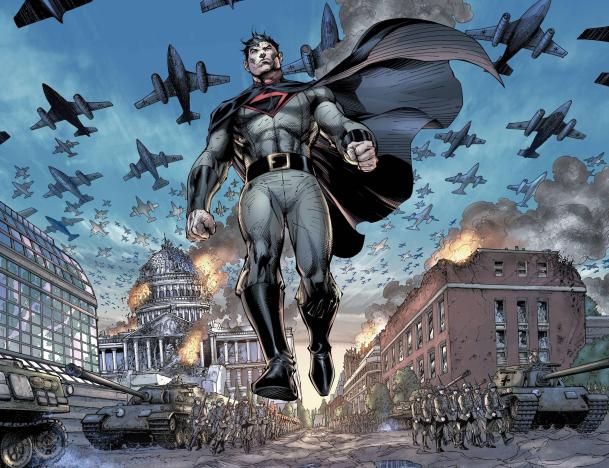The Vanier Report: Week 6
Before we get started this week, I wanted to address what I consider to be an argument central to one’s potential enjoyment of The Multiversity: Mastermen #1. As I was browsing Twitter, a wonderful comic creator, lover, and blogger – whose writing and opinion I admire immensely – made the comment that she is getting tired of the deconstruction of Superman. More specifically, she lamented the continued exploration of “bad” versions of the character.
Frankly, I have to agree with her. It’s been a problem with the writing of Superman since “The Death of Superman” in the 90s (which I touched on myself in an article over on Modern Mythologies entitled The True Last Son of the House of El). It seems, generally, that writers are bored of Superman being inspiring, optimistic, and uplifting, and believe that the only real source of interest is in a world where Superman is either dead, corrupted, or outright evil.
That said, I disagree that this is what is happening in the pages of Mastermen.
I believe that Superman and the Justice League – and their many parallel-world counterparts – always represent the prevailing ideology of their world, as was found (in yet another shameless plug) with my article The Moral Arcs of Histories. On Earths 0-2, this positions them as a force for good, because the world itself tends towards good. Likewise, on Earth 3, where the prevailing morality of the world is of strength and aggression, Ultraman and the Crime Syndicate once again defend that world’s ideology.
So as we get into the nitty-gritty of Grant Morrison’s latest chapter of The Multiversity, let’s keep in the back of our minds that Overman – the Superman of Earth 10 – is not “evil” or “corrupted” in the traditional sense, but rather the product of a world whose overarching morality is skewed compared to our own. Viewing the book through this lens is, I believe, crucial to appreciating the history Morrison is telling us.
The Multiversity: Mastermen #1
Written by: Grant Morrison
Pencils by: Jim Lee
Inks by: Scott Williams, Sandra Hope, Mark Irwin, and Jonathan Glapion
Colours by: Alex Sinclair and Jeromy Cox
Letters by: Rob Leigh
Enough set up, let’s get to it.
Near the end of World War II, our (not so) familiar Kryptonian baby crash landed in the Sudetenland. Taken in by the Nazis, he became Hitler’s secret weapon, allowing Germany to not only win the war in Europe, but to invade and subdue America as well. Decades later, the seemingly immortal Overman and his New Reichsmen – Earth 10’s version of the Justice League – struggle to preserve peace and order against the rise of the powerful metahuman terrorist group known as the Freedom Fighters.
This is the framework with which Morrison structures his story. Overman is not portrayed as the enemy. Even on an Earth guided by Nazi ideology, he is portrayed as a sympathetic character: one who believes in autocracy, but as a means of providing peace and safety; one who, admittedly, believes in Aryan superiority, but is deeply tortured by the Holocaust that occurred without his knowledge nor blessing. He is still, in a somewhat twisted way, our Superman: a deeply compassionate being who believes in the value of life.
The difference, of course, is that when crossed, Overman is considerably less gracious than our Superman. Following the death of Overgirl and a rash of attacks by the mysterious Uncle Sam, Overman begins to feel his control waning, and as the façade cracks even his own allies begin to doubt him. Conversely, the Freedom Fighters are constantly gaining strength, thanks in part to Earth 10’s Doktor Sivana providing them with extra-dimensional weapons and the means to create new metahuman soldiers such as the Ray and Black Condor.
Morrison’s script plays with this moral ambiguity. The Freedom Fighters are undoubtedly the protagonists of the story, and yet their association with the Legion of Sivanas compromises that position in the eyes of the reader. Moreover, their willingness to sacrifice civilian lives in the course of their fight is considerably unheroic. On the other hand, Overman is clearly not the hero we know and love, and yet we are forced to witness the entire story through his eyes. Humanizing Overman is a deeply disturbing experience (as one may imagine, siding in any way with the Nazis is truly unsettling), but Morrison is not just writing about Earth 10, he is writing the Multiverse. And in doing so, he presents each world, including Earth 10, through its own moral lens.
Jim Lee’s art does a great job of contributing to the moral ambiguity of the story. With few exceptions (including Leatherwing’s ungodly monstrous thighs at Overgirl’s funeral), he manages to illustrate a world where the line between good and evil is no longer commonly understood. Uncle Sam’s ancient wisdom recalls the freedom of America before the War, but for many – including Leatherwing, Blitzen, and Brunhilde – the only “right” they’ve known is the history as written by the victors. But in Overman and Underwaterman, Jim Lee’s pencils sow the seeds of doubt.
This issue falls back into more of a standalone model than last month’s Multiversity Guidebook, which is why I think, in spite of the incredible richness of the world – both in terms of the writing and the visuals – that the relative lack of action was the one weak point of the issue. I would never trade story for beat-em-ups, but that doesn’t mean that I wasn’t hoping to see the Freedom Fighters and New Reichsmen in action.
But given all we know of the Legion of Sivanas and the coming devastation of the Gentry, what is exciting is seeing how the shame, doubt, and regret that permeate Earth 10 will factor into the world’s role in the macro-arc. Will the threat of multiversal annihilation galvanize the splintered moralities of Overman and the Freedom Fighters? Or is the weight of the past too much to be overcome, even in the face of Armageddon?
________________________________________________________
Feature Written By: Reid Vanier
![]()
“Reid is a comic book fan masquerading as a theatre artist. His love of comics (specifically DC) was inherited by his father’s collections of Flash, Superboy and the Legion of Super-Heroes, and Justice League of America. Reid is now the Editor and Lead Writer of Modern Mythologies.”




